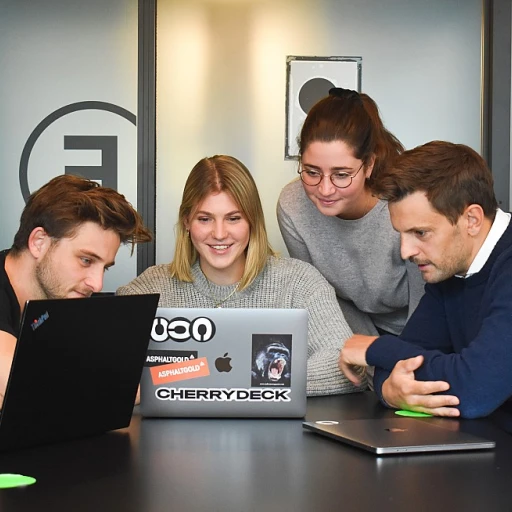
Understanding generative AI in workforce training
The integration of generative AI into workforce training is revolutionizing how companies approach employee development and career growth. By leveraging advanced technology, organizations are finding innovative solutions to address skill gaps and enhance learning experiences. This adaptive learning approach is transforming training programs, offering real-time insights and flexibility that traditional methods fail to provide.
Harnessing AI for Enhanced Learning
Generative AI gives business leaders the ability to implement customizable training strategies that cater to individual needs. It empowers employees by providing personalized learning paths, fostering unique development journeys. Such generative tools cultivate a more engaged and motivated workforce, as skill acquisition becomes more aligned with real-world job demands.
The Role of Data and Insights
When talking about workforce development, data is vital. Through data-driven insights, organizations are able to tailor training to ensure the utmost efficiency. Accessible data allows for continuous monitoring and assessment of employee progress, making it simpler to adjust training programs as required.
Supporting Employee Growth
The future of work lies in empowering employees to drive their own learning and development. Through AI-driven solutions, organizations create a supportive environment where skills can be honed, keeping pace with evolving business needs. By elevating workforce training to a dynamic and engaging process, companies are setting a foundation for continuous career development.
For additional reading on how technology is shaping workspaces, check out this article.
Benefits of generative AI for training programs
The Transformative Advantages of Generative AI in Workforce Training
Generative AI has ushered in a new era of possibilities for training programs, enabling companies to deliver customized and effective learning experiences. The future of training in the workplace is being reshaped by these innovative tools, which offer a range of significant benefits to both employees and organizations. One of the major advantages is the ability of generative AI to address skill gaps through adaptive learning. This dynamic approach tailors training efforts based on real-time data, ensuring employees develop the skills necessary to excel in their roles. With the ever-evolving demands of the modern workforce, adaptive learning fosters continuous employee development, making it a valuable asset for business leaders seeking to maintain a competitive edge. Moreover, artificial intelligence-driven tools enhance the personalization of training strategies. By analyzing individual learning patterns, generative solutions can create tailored programs that resonate with employees' career aspirations and work needs. Such personalization not only boosts employee engagement but also ensures more effective skill acquisition. In addition, the integration of AI into workforce training provides organizations with cost-effective and scalable solutions. This technology allows for the automation of mundane training processes, freeing up human resources to focus on more strategic employee development initiatives. Furthermore, AI tools facilitate innovative and flexible learning environments, empowering employees to progress at their own pace. As companies strive to prepare their workforce for the future, the implementation of generative AI in training programs is a game-changer. Organizations that leverage these technologies can expect to see improved employee performance, better alignment with business goals, and a more resilient and adaptive workforce. For more insights on how AI is influencing training development, check out this enhancing skills through AI-driven training article.Challenges faced by startups using generative AI
The Hurdles Faced by New Entrants
While generative technologies herald a new dawn in workforce development, they are not without challenges, particularly for startups navigating this space. These enterprises, eager to leverage AI innovations in training, may encounter obstacles in various dimensions, demanding strategic solutions for sustainability.
Roadblocks in Integrating AI and Data Utilization
One primary challenge is the seamless integration of generative AI within existing training programs. Startups must ensure that the AI tools are compatible with current technologies, which may be a complex task given the rapid evolution of digital solutions. Moreover, managing and interpreting vast volumes of data generated by these tools requires significant efforts to maintain efficiency.
Furthermore, data privacy and security remain pivotal concerns. With AI systems deploying sophisticated algorithms to tailor learning experiences, protecting sensitive information becomes paramount. Startups must address these concerns to build trust among employees and clients alike. Navigating such challenges necessitates expertise in not only AI technology but also in privacy regulations.
Funding and Resource Allocation
Financial constraints can also impede the progress of startups aiming to disrupt the training ecosystem. The costs associated with developing and maintaining advanced AI systems can be significant. As such, startup organizations must secure adequate funding to support their growth.
Additionally, training development isn't solely about technology. Companies need to invest in human resources to refine AI algorithms and design adaptive learning paths that truly assist each employee. Balancing these financial and personnel resources effectively can be a daunting prospect but is crucial for any business venture.
Overcoming Skepticism and Adoption Hesitancy
An often-overlooked challenge is the cultural resistance to adopting innovative technology. Employees who are accustomed to traditional training methodologies may exhibit reluctance in embracing AI-driven solutions. Here, companies must address concerns through adaptive learning strategies that ensure an engaging and effective career progression.
Business leaders must champion the long-term benefits of such workforce training solutions, demonstrating their potential in facilitating both employee development and closing skill gaps. A transparent strategy that communicates the value of AI integration helps in building case studies that showcase the transformative journey from hesitation to acceptance.
Case studies of successful AI-driven training startups
Real-World Examples of AI-Driven Training Success
In the rapidly evolving landscape of workforce training, several startups have successfully harnessed generative AI to transform employee development. These companies have not only addressed skill gaps but also set new benchmarks for innovative training strategies.
One notable example is a startup that developed an adaptive learning platform tailored to individual employee needs. By leveraging generative tools, this company provides real-time feedback and personalized learning experiences, ensuring that employees acquire the necessary skills efficiently. This approach has significantly improved workforce development, enabling organizations to keep pace with future work trends.
Another success story comes from a company that integrated AI-driven solutions into their training programs to enhance data analysis capabilities. By utilizing advanced technology, they offer insights into employee performance and learning patterns, allowing human resources to make informed decisions about career development and training strategies. This data-driven approach has proven invaluable for business leaders aiming to optimize their workforce training initiatives.
Additionally, a startup focusing on privacy security has made strides in ensuring data privacy while using AI in employee training. By implementing robust security measures, they have built trust with organizations concerned about data privacy issues, demonstrating that AI can be both innovative and secure.
These case studies highlight the transformative potential of generative AI in workforce training. As more companies adopt these technologies, the future of work will likely see even more groundbreaking developments in employee training and development.













